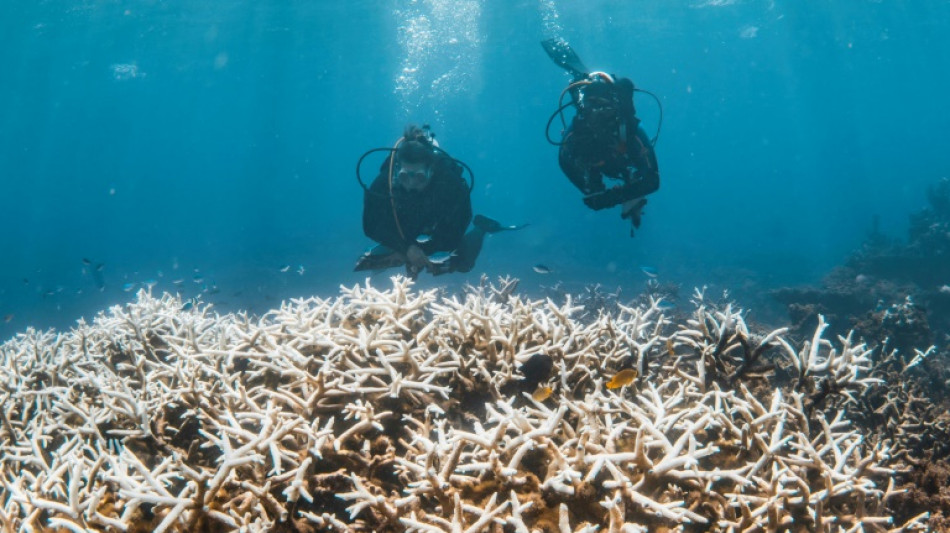
-
 Myanmar pro-military party claims Suu Kyi's seat in junta-run poll
Myanmar pro-military party claims Suu Kyi's seat in junta-run poll
-
Fed chair Powell says targeted by federal probe

-
 Trailblazing Milos Raonic retires from tennis
Trailblazing Milos Raonic retires from tennis
-
Australia recalls parliament early to pass hate speech, gun laws

-
 'One Battle After Another,' 'Hamnet' triumph at Golden Globes
'One Battle After Another,' 'Hamnet' triumph at Golden Globes
-
Japan aims to dig deep-sea rare earths to reduce China dependence

-
 Top UN court to hear Rohingya genocide case against Myanmar
Top UN court to hear Rohingya genocide case against Myanmar
-
US sends more agents to Minneapolis despite furor over woman's killing

-
 Trump says Iran 'want to negotiate' after reports of hundreds killed in protests
Trump says Iran 'want to negotiate' after reports of hundreds killed in protests
-
Bangladesh's powerful Islamists prepare for elections

-
 NBA-best Thunder beat the Heat as T-Wolves edge Spurs
NBA-best Thunder beat the Heat as T-Wolves edge Spurs
-
Ukraine's Kostyuk defends 'conscious choice' to speak out about war

-
 Trump says working well with Venezuela's new leaders, open to meeting
Trump says working well with Venezuela's new leaders, open to meeting
-
Asian equities edge up, dollar slides as US Fed Reserve subpoenaed

-
 Hong Kong court hears sentencing arguments for Jimmy Lai
Hong Kong court hears sentencing arguments for Jimmy Lai
-
Powell says Federal Reserve subpoenaed by US Justice Department

-
 Chalamet, 'One Battle' among winners at Golden Globes
Chalamet, 'One Battle' among winners at Golden Globes
-
Turning point? Canada's tumultuous relationship with China

-
 Eagles stunned by depleted 49ers, Allen leads Bills fightback
Eagles stunned by depleted 49ers, Allen leads Bills fightback
-
Globes red carpet: chic black, naked dresses and a bit of politics

-
 Maduro's fall raises Venezuelans' hopes for economic bounty
Maduro's fall raises Venezuelans' hopes for economic bounty
-
Golden Globes kick off with 'One Battle' among favorites

-
 Australian Open 'underdog' Medvedev says he will be hard to beat
Australian Open 'underdog' Medvedev says he will be hard to beat
-
In-form Bencic back in top 10 for first time since having baby

-
 Swiatek insists 'everything is fine' after back-to-back defeats
Swiatek insists 'everything is fine' after back-to-back defeats
-
Wildfires spread to 15,000 hectares in Argentine Patagonia

-
 Napoli stay in touch with leaders Inter thanks to talisman McTominay
Napoli stay in touch with leaders Inter thanks to talisman McTominay
-
Meta urges Australia to change teen social media ban

-
 Venezuelans await political prisoners' release after government vow
Venezuelans await political prisoners' release after government vow
-
Lens continue winning streak, Endrick opens Lyon account in French Cup

-
 McTominay double gives Napoli precious point at Serie A leaders Inter
McTominay double gives Napoli precious point at Serie A leaders Inter
-
Trump admin sends more agents to Minneapolis despite furor over woman's killing

-
 Allen magic leads Bills past Jaguars in playoff thriller
Allen magic leads Bills past Jaguars in playoff thriller
-
Barca edge Real Madrid in thrilling Spanish Super Cup final

-
 Malinin spearheads US Olympic figure skating challenge
Malinin spearheads US Olympic figure skating challenge
-
Malinin spearheads US figure Olympic figure skating challenge

-
 Iran rights group warns of 'mass killing', govt calls counter-protests
Iran rights group warns of 'mass killing', govt calls counter-protests
-
'Fragile' Man Utd hit new low with FA Cup exit

-
 Iran rights group warns of 'mass killing' of protesters
Iran rights group warns of 'mass killing' of protesters
-
Demonstrators in London, Paris, Istanbul back Iran protests

-
 Olise sparkles as Bayern fire eight past Wolfsburg
Olise sparkles as Bayern fire eight past Wolfsburg
-
Man Utd knocked out of FA Cup by Brighton, Martinelli hits hat-trick for Arsenal

-
 Troubled Man Utd crash out of FA Cup against Brighton
Troubled Man Utd crash out of FA Cup against Brighton
-
Danish PM says Greenland showdown at 'decisive moment' after new Trump threats

-
 AC Milan snatch late draw at Fiorentina as title rivals Inter face Napoli
AC Milan snatch late draw at Fiorentina as title rivals Inter face Napoli
-
Venezuelans demand political prisoners' release, Maduro 'doing well'

-
 'Avatar: Fire and Ashe' leads in N.America for fourth week
'Avatar: Fire and Ashe' leads in N.America for fourth week
-
Bordeaux-Begles rout Northampton in Champions Cup final rematch

-
 NHL players will compete at Olympics, says international ice hockey chief
NHL players will compete at Olympics, says international ice hockey chief
-
Kohli surpasses Sangakkara as second-highest scorer in international cricket


Coral reefs pushed to brink as bleaching crisis worsens
An unprecedented coral bleaching episode has spread to 84 percent of the world's reefs in an unfolding human-caused crisis that could kill off swathes of the essential ecosystems, scientists warned Wednesday.
Since it began in early 2023, the global coral bleaching event has mushroomed into the biggest and most intense on record, with reefs across the Pacific, Indian and Atlantic oceans affected.
Coral turns ghostly white under heat stress and the world's oceans have warmed over the last two years to historic highs, driven by humanity's release of planet-warming greenhouse gases.
Reefs can rebound from the trauma but scientists told AFP the window for recovery was getting shorter as ocean temperatures remained higher for longer.
Conditions in some regions were extreme enough to "lead to multi-species or near complete mortality on a coral reef", said the US National Oceanic and Atmospheric Administration (NOAA).
This latest episode was so severe and lasting that even more resilient coral was succumbing, said Melanie McField from the Healthy Reefs for Healthy People initiative, which specialises in the Caribbean.
"If you continue to have heatwave after heatwave, it's hard to see how that recovery is going to happen," the veteran reef scientist told AFP from Florida.
Bleaching occurs when coral expels algae that provides not just their characteristic colour but food and nutrients, leaving them exposed to disease and possibly eventually death.
Live coral cover has halved since the 1950s due to climate change and environmental damage, the International Coral Reef Initiative, a global conservation partnership, said in a statement Wednesday.
Scientists forecast that at 1.5C of warming, some 70 to 90 percent of the world's coral reefs could disappear -- a disastrous prospect for people and the planet.
Coral reefs support not just marine life but hundreds of millions of people living in coastal communities around the world by providing food, protection from storms, and liveloods through fishing and tourism.
- Coral crisis -
Mass coral bleaching was first observed in the early 1980s and is one of the best known and most visible consequences of steadily rising ocean temperatures caused by global warming.
The latest coral bleaching event is the fourth and largest yet, and the second in a decade, exceeding the record area affected during the last episode of 2014-2017.
"From 1 January 2023 to 20 April 2025, bleaching-level heat stress has impacted 83.7 percent of the world's coral reef area", NOAA said in its latest update on Monday.
Oceans store 90 percent of the excess heat caused by humanity's burning of fossil fuels, causing warmer sea temperatures, which are the leading cause of coral bleaching.
"The link between fossil fuel emissions and coral mortality is direct and undeniable," said Alex Sen Gupta, a climate scientist at the University of New South Wales in Australia.
To accurately accommodate the increased risk of mass coral death due to this event, NOAA was forced to add three new levels to a widely used bleaching alert scale.
"It's the coral reef equivalent of adding Category 6 and 7 to the tropical cyclone scale," said Sen Gupta.
- 'Mass mortalities' -
McField said in September 2023, an iconic reef off Honduras was suffering bleaching but still boasted 46 percent average living coral coverage.
"By February 2024, all of that died, and it was down to five percent living coral... We never saw that before, these mass mortalities," McField said.
The planet has already warmed at least 1.36 degrees Celsius above pre-industrial times, says the EU's climate monitor Copernicus.
Scientists predict the 1.5C threshold could be crossed early in the next decade.
At 2C almost all corals would disappear.
If the current climate policies of all governments were implemented in full, the world could warm by up to 3.1C by 2100.
G.AbuGhazaleh--SF-PST



